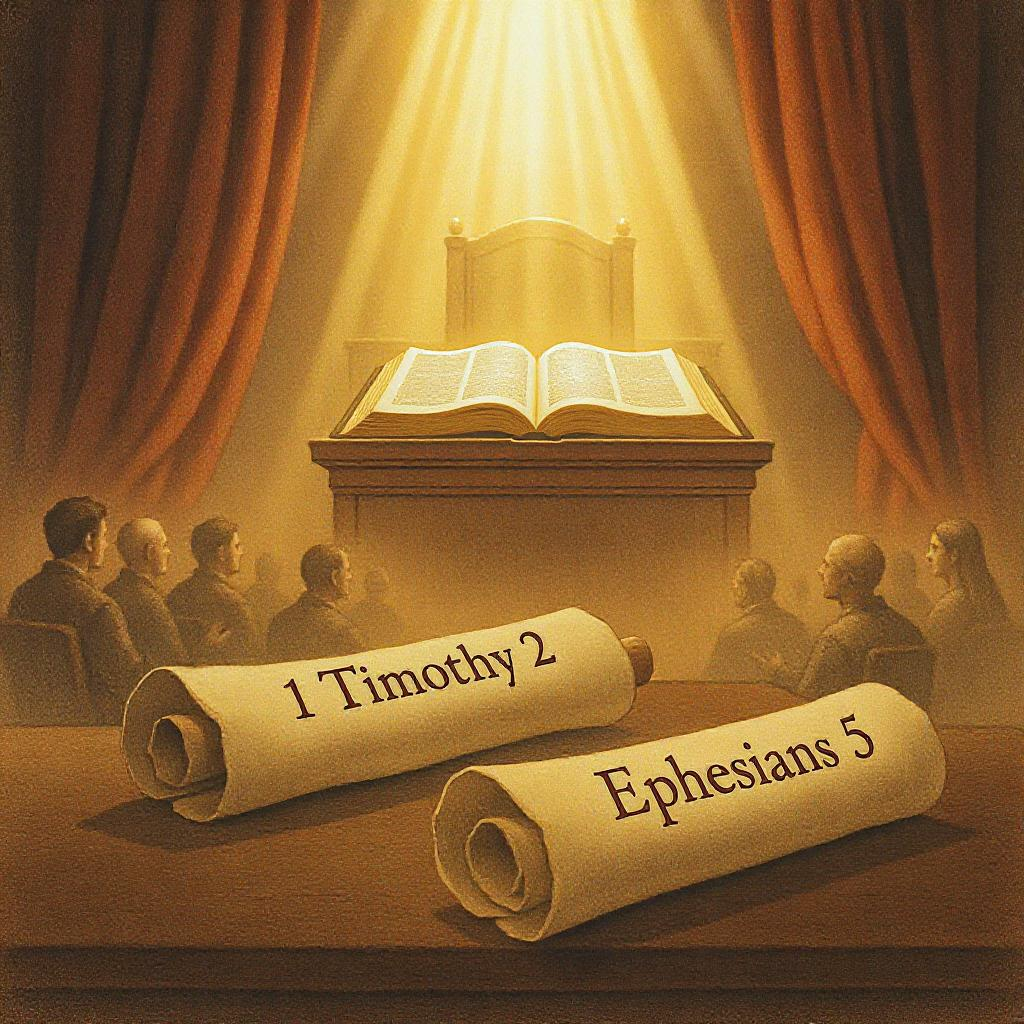God’s Design for Man and Woman: A Comprehensive Case for Complementarianism, Part 3
Posted on 06/30/2025 at The Curmudgeon’s Chronicle

New Testament Foundations: God’s Design for Church Leadership
At the 2024 PCA General Assembly, Overture 3’s failed bid to restrict preaching to men, citing 1 Timothy 2:12, ignited debate. Stricter complementarians sought to bar women from teaching men in any formal setting, while moderates defended male-only ordination but allowed non-ordained roles like Scripture reading. This clash over biblical gender roles amid cultural pressures urges us to explore New Testament foundations for complementarianism.
The 2024 PCA General Assembly’s heated debate over women’s teaching roles reflects a broader struggle in evangelical churches. Should women preach or lead as pastors? The question sparks passionate arguments, often clouded by cultural trends or scholarly missteps. I approached this study with an open mind, ready to wrestle with Scripture, even if it challenged my complementarian convictions. While Bible’s teaching was clear, egalitarian scholarship – by figures like Linda Belleville, Philip Payne, and Rebecca Groothuis – often faltered, misusing sources like the KJV, the Vulgate, or Greek lexicons in ways that seem to assume readers won’t verify. Building on our prior foundation in Genesis, where God designed men and women as distinct yet complementary, with Eve as “an help meet for him,” we now turn to the New Testament. Here, 1 Timothy 2:12, Ephesians 5:22-33, and 1 Corinthians 14:34-35 establish God’s design for church leadership: men as pastors and elders, women in vital, complementary roles. Let’s test all claims against Scripture to uncover God’s blueprint.

1 Timothy 2:12: A Clear Prohibition
Paul’s words in 1 Timothy 2:12 are striking: “But I suffer not a woman to teach, nor to usurp authority over the man, but to be in silence.” Written to Timothy in Ephesus, where false teachers threatened the church (1 Timothy 1:3), this verse sets boundaries for church order. The key term is αὐθεντέω (authenteō, to exercise authority), translated “usurp authority” in the KJV and dominari (doh-MEE-nah-ree, to rule, exercise lordship) in the Latin Vulgate. Let’s unpack these terms to understand Paul’s intent.
The Greek αὐthεντέω (authenteō, to exercise authority), this verse containing the only New Testament use of this word, means “to assume a stance of independent authority” or “to have full power or authority over.” A 27 BC papyrus (BGU 1208) uses αὐθεντέω for legal authority. Gary Manning notes: "αὐθεντηκότος is a perfect participle in a genitive absolute construction... Tryphon did not inherently have authority over Antilochos, but... he made a complaint to the strategos, and he and Asclepiades withheld payment... These two actions result in him now having some ability to push Antilochos to agree to terms... The translation 'Since I had exercised authority' or 'since I had asserted authority' thus seem to be consistent..." Manning concludes the word does not represent an abusive or ingressive act. In 1 Timothy 2:12, αὐthεντέω, paired with “teach,” prohibits women from authoritative teaching over men in the church.
In The Vulgate, the use of dominari in virum in 1 Timothy 2:12 is likely stative, describing the ongoing state of exercising authority over a man (or husband), rather than ingressive (beginning to rule) or abusive (tyrannical domineering), as the context of church roles and the in + accusative construction suggest general authority, not its initiation or misuse. Harper’s Latin Dictionary supports this, stating, “dŏmĭnor, ātus... to be lord and master, to have dominion, bear rule... With inter or in: inter aliquos, *Caes. B. G. 2, 31 fin.;... in adversarios, Liv. 3, 53: in cetera (animalia), Ov. M. 1, 77.” These examples, particularly “in adversaries” and “in cetera animalia,” parallel “in virum” by showing dominari as denoting ongoing authority over a specific group, reinforcing the stative interpretation without implying the start or abuse of rule.
Egalitarians like Payne and Belleville challenge the traditional interpretation of 1 Timothy 2:12. Payne argues that Paul’s restriction in this verse was context-specific, stating, “In order to limit the teaching of false doctrine that threatens the life of the church in Ephesus, in 1 Tim 2:12 Paul restricts the group most affected, ‘I am not permitting a woman to assume authority to teach a man.’” Similarly, Belleville, as cited by Pierce and Groothuis, emphasizes a historical translation trend that renders the Greek term authentein as “to dominate” rather than “to exercise authority over.” For example, the Old Latin versions from the second to fourth centuries translate the verse as “I permit not a woman to teach, neither to dominate a man” (neque dominari viro), while the Vulgate, from the fourth to fifth centuries, uses neque dominari in virum to suggest domineering rather than legitimate authority. This pattern persists in later translations, such as the 1560 Geneva Bible, which states, “I permit not a woman to teache, nether to vfurpe authoritie ouer the man,” and the 1569 Casiodoro de Reina, which reads, “I do not permit the woman to teach, neither to take authority over the man” (ni tomar autoridad sobre el hombre). The 1589 Bishops’ Bible and the 1611 King James Version further align with this, rendering it as “I suffer not a woman to teach, neither to usurpe authoritie over the man” and “I suffer not a woman to teach nor usurp authority over a man,” respectively. This consistent tradition, spanning centuries, suggests a nuanced understanding of authentein as domination rather than rightful authority.
These egalitarian claims, however, face challenges. The KJV’s use of “usurp” in 1611 English could mean “to exercise or practice a right,” not solely “seize unlawfully,” and lacks ingressive markers. Similarly, as shown above, the Latin dominari is stative, not ingressive, with no inchoative forms. Furthermore, as demonstrated already, the Greek authenteō shows no ingressive aspect in key sources like BGU 1208, BDAG, or LSJ, undermining the idea of a temporary or situational prohibition. Paul’s appeal to creation – “For Adam was first formed, then Eve” (1 Timothy 2:13) – further grounds the prohibition in God’s universal design, not merely Ephesian culture.
Egalitarians often cite Galatians 3:28 – 'there is neither male nor female: for ye are all one in Christ Jesus' – to argue for identical roles, but its context (salvation through faith, Galatians 3:26-29) addresses spiritual equality, not function. In Recovering Biblical Manhood and Womanhood, Douglas Moo argues that the prohibitions in 1 Timothy 2:12, which restrict women from teaching or exercising authority over men, are transcultural and grounded in theology, particularly Paul’s appeal to creation order in 1 Timothy 2:13. He concludes that these restrictions apply to all Christians across all times and places, as the New Testament’s consistent teaching and lack of textual exceptions provide no basis for limiting their application. This aligns with Genesis 2’s עֵזֶר (ezer, helper) design, refuting claims that equality erases roles.
Thomas Schreiner clarifies that 1 Timothy 2:12’s prohibition is rooted in creation, not culture. Linked to elder qualifications (1 Timothy 3:2, “apt to teach”), this restriction reserves authoritative teaching and leadership for men, echoing Article 2’s Genesis foundation, where Eve was created as an עֵזֶר (ezer, helper) for Adam. Egalitarian attempts to limit 1 Timothy 2:12 to abusive or temporary acts misrepresent the KJV, Vulgate, and Greek, and seem to assume readers won’t check sources.
Ephesians 5:22-33: Marriage and Church Order
Ephesians 5:22-33 connects marriage to church leadership: “Wives, submit yourselves unto your own husbands, as unto the Lord. For the husband is the head of the wife, even as Christ is the head of the church.” The Greek term κεφαλή (kephalē, head) means “a being of high status, head” and “in the case of living beings, to denote superior rank,” reflecting the husband’s servant-leadership, modeled on Christ’s sacrificial love (Ephesians 5:25). This mirrors Article 2’s Genesis 2:18, where Eve as עֵזֶר (ezer, helper) complements Adam’s leadership. Paul ties marriage to the church: “This is a great mystery: but I speak concerning Christ and the church” (Ephesians 5:32).
This headship informs church order: just as husbands lead in marriage, men lead as pastors and elders. Egalitarians often argue κεφαλή means “source” or “equality,” but First Corinthians 11:3 refutes this: “The head of every man is Christ; and the head of the woman is the man; and the head of Christ is God.” Does the Father “source” Christ, implying origin? No – orthodox theology affirms the Son’s eternality, with the Father’s headship as authority. Is the church “equal” to Christ? No – it submits to His lordship. Likewise, κεφαλή denotes authority, as BDAG and Ephesians 5:22-24’s submission context confirm. We’ll explore κεφαλή further in Article 7, but here, it underscores complementarian roles: men lead, women complement, rooted in creation and Christ’s church.
1 Corinthians 14:34-35: Silence in Worship
In 1 Corinthians 14:34-35, Paul instructs: “Let your women keep silence in the churches: for it is not permitted unto them to speak; but they are commanded to be under obedience, as also saith the law.” Corinth’s disorderly worship (1 Corinthians 14:33) prompted this rule. “Silence” doesn’t mean total silence – women prayed and prophesied (1 Corinthians 11:5) – but prohibits authoritative teaching, aligning with 1 Timothy 2:12. Moreover, Paul’s appeal to “the law” likely points to Genesis 2’s creation order, where Eve’s role as ezer (helper) complements Adam’s leadership. This aligns with 1 Timothy 2:13, grounding the prohibition in God’s universal design.
Egalitarians claim this is cultural, tied to Corinthian disruptions. Craig L. Blomberg counters: “Finally, the appeal to ‘the law,’ which teaches women’s submission, suggests Paul is again grounding his instruction in some more culture-transcending principle. Attempts to limit this nomos (‘law’) to extrabiblical Jewish tradition or Greco-Roman legislation require Paul to have used this term, without explanatory qualification, in a very uncharacteristic way, since normally he means Torah (any or all of the Hebrew Bible) by the term. Attempts to limit his reference to post-fall arrangements in the OT, no longer incumbent on believers, makes Paul’s instruction incoherent. Why would he appeal to a principle he recognizes no longer supports his ethic?” The appeal to “the law” and consistency with 1 Timothy 2:12 suggest a universal principle. Women’s complementary roles, like teaching other women or children (Titus 2:3-5), remain vital, but authoritative speech in worship is reserved for men, reflecting God’s design across Scripture.
Additional New Testament Clarity
1 Peter 3:1-7 and Titus 2:3-5 further illuminate complementarian roles. In 1 Peter 3:1, wives are called to submit (Greek ὑποτάσσω, hypotassō, to place under authority) to husbands, who honor them as “joint heirs” (3:7), echoing Ephesians 5’s κεφαλή (kephalē, head) framework. This reinforces male leadership in home and church, rooted in Genesis 2’s creation order. Titus 2:3-5 urges older women to be teachers (διδάσκαλος, didaskalos, instructor, non-authoritative) of younger women, guiding them in godliness. This role equips families without violating 1 Timothy 2:12’s prohibition on authoritative teaching. These passages affirm women’s vital contributions, complementing male eldership.
Egalitarian Counterarguments
Egalitarians offer alternative readings. Payne insists: “With only one exception, 1 Cor 14:34, which is widely regarded as an interpolation, the verb ‘to permit’ (ἐπιτρέπω) never refers to a universal or permanent situation in any of its uses in the LXX or NT. Especially its use in the first person singular present indicative makes it unlikely that Paul intended 1 Tim 2:12 as a universal or permanent prohibition.” Rebecca Groothuis claims: “Extensive recent research into ancient Greek usage of this term suggests that at the time Paul wrote this letter to Timothy, authentein did not refer to exercising authority in the capacity of an authorized official. Rather, it ‘included a substantially negative element (i.e., ‘dominate, take control by forceful aggression, instigate trouble’).’” These arguments, alongside Belleville’s claims about dominari and “usurp authority” (addressed above), weaken under scrutiny.
Egalitarian arguments, such as those from Payne, Belleville, and Groothuis, often rely on selective readings of authenteō and dominari, suggesting temporary or abusive connotations. However, as we’ve seen, BDAG, LSJ, and BGU 1208 define authenteō as “to exercise authority” or “assume authority over” in 1 Timothy 2:12, with no inherent abusive or ingressive sense. The Vulgate’s dominari, supported by Harper’s Latin Dictionary, denotes ongoing authority, not temporary or tyrannical rule. Payne’s claim that Paul’s prohibition is context-specific ignores the universal creation order cited in 1 Timothy 2:13, which echoes Genesis 2’s עֵזֶר (ezer, helper) design, as Schreiner affirms. Similarly, Belleville’s emphasis on “dominate” over “authority” misaligns with the Greek and Latin evidence, while Galatians 3:28, as Moo notes, addresses salvation equality, not functional roles. These egalitarian interpretations often assume readers won’t scrutinize sources, a pattern we’ve observed. Article 4 will further examine egalitarian claims, but the New Testament’s consistent teaching – 1 Timothy 2:12, Ephesians 5:22-33, and 1 Corinthians 14:34-35 – upholds God’s complementarian design for church leadership.
Practical Applications
What does this mean for churches? First, 1 Timothy 2:12 and 3:1-7 call for male-only pastors and elders, reflecting God’s design in creation and the church. Yet, women’s roles are vital. Titus 2:3-5 urges older women to teach younger women and children, equipping families with wisdom. Women also serve in non-authoritative capacities, and use their gifts to edify the body. The 2024 PCA debates highlight the need for clarity amid cultural confusion. Scripture, not flawed egalitarian arguments like Belleville’s, Payne’s, or Groothuis’, guides us. Article 8 will address deacons and head coverings, but for now, churches must hold fast to biblical roles, trusting God’s design brings flourishing.

Conclusion
Picture Scripture as a judge, weighing egalitarian claims against God’s design. 1 Timothy 2:12, Ephesians 5:22-33, and 1 Corinthians 14:34-35 establish complementarianism: men lead as pastors and elders, women shine in complementary roles, rooted in creation’s order. Egalitarian arguments, from Belleville’s misuse of dominari to Groothuis’ semantic errors, falter against Scripture and sources. Article 4 will ask: Can egalitarianism stand up to Scripture’s witness? Let’s test all claims against God’s Word, praying for wisdom to live out His beautiful design, reflecting Christ and the church (Ephesians 5:32).
References
- Philip Barton Payne, Man and Woman, One in Christ: An Exegetical and Theological Study of Paul’s Letters, Kindle edition (Grand Rapids, MI: Zondervan, 2009), 395.
- Rebecca Groothuis, Good News for Women: A Biblical Picture of Gender Equality, Kindle edition (Grand Rapids, MI: Baker Publishing Group, 1997), 248-249.
- Ronald W. Pierce and Rebecca Merrill Groothuis, Discovering Biblical Equality: Complementarity without Hierarchy (Downers Grove, IL: InterVarsity Press, 2005), 209–210.
- William Arndt et al., A Greek-English Lexicon of the New Testament and Other Early Christian Literature (Chicago: University of Chicago Press, 2000).
- Henry George Liddell et al., A Greek-English Lexicon (Oxford: Clarendon Press, 1996), 275.
- Charlton T. Lewis and Charles Short, Harpers’ Latin Dictionary (New York; Oxford: Harper & Brothers; Clarendon Press, 1891), 608.
- Gary Manning, BGU 1208, A Letter from Tryphon to Asclepiades: Translation and Explanation (unpublished manuscript, Talbot School of Theology, Biola University, n.d.), 5, Academia.edu.
- Douglas Moo, “What Does It Mean Not to Teach or Have Authority over Men?: 1 Timothy 2:11–15,” in Recovering Biblical Manhood & Womanhood: A Response to Evangelical Feminism, ed. John Piper and Wayne Grudem (Wheaton, IL: Crossway, 2006), 193.
- Thomas R. Schreiner, “An Interpretation of 1 Timothy 2:9–15: A Dialogue with Scholarship,” in Women in the Church: An Interpretation and Application of 1 Timothy 2:9–15, ed. Andreas J. Köstenberger and Thomas R. Schreiner, Third Edition (Wheaton, IL: Crossway, 2016), 224-225.
- Craig L. Blomberg, “Women in Ministry: A Complementarian Perspective,” in Two Views on Women in Ministry, ed. Stanley N. Gundry and James R. Beck, Revised Edition, Zondervan Counterpoints Series (Grand Rapids, Mi: Zondervan, 2005), 164-165.